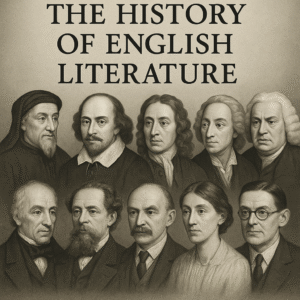1. Social problem novels highlight industrial issues The development of social problem novels shaped Edwardian literature with striking clarity. Edwardian writers highlight industrial struggles through vivid details of factories, smoke, and harsh labor conditions. Therefore, the development of social problem Read More …
Category: The History of English Literature

The History of English Literature offers a rich exploration of the development of literary works from the earliest Anglo-Saxon texts to contemporary masterpieces. This category provides in-depth articles, study guides, quizzes, and timelines covering key literary periods such as the Old English era, Middle English literature, the Renaissance, Neoclassical Age, Romantic Movement, Victorian literature, and Modernist innovations. Whether you are a student, researcher, or literature enthusiast, you’ll find detailed analyses of major writers like Geoffrey Chaucer, William Shakespeare, John Milton, Jane Austen, Charles Dickens, and T.S. Eliot. Discover how historical events, cultural movements, and philosophical ideas shaped the evolution of English literature over the centuries. Enhance your understanding of literary techniques, themes, and genres as you navigate through the fascinating journey of English literary history. This resource is ideal for exam preparation, academic research, and anyone passionate about the legacy of English literary traditions.
The Edwardian Period (1901-1914)- A Comprehensive Guide
1. Introduction to the Edwardian Period The Edwardian Period stretched from 1901 to 1914, following the Victorian era. It marked a time of transition, progress, and cultural transformation. Unlike the Victorian age, this period was less rigid in moral values Read More …
John Ruskin as Prose Writer of Victorian Period
I. The Genesis of the Victorian Sage 1. Evangelical and Romantic Roots of Ruskin’s Worldview John Ruskin as prose writer built his powerful prose, which originated from deep, complex, and profound roots. Furthermore, his core worldview blended both Evangelical and Read More …
Algernon Charles Swinburne as Poet of the Victorian Period
Introduction Algernon Charles Swinburne as Poet of the Victorian Period represents bold innovation, technical mastery, and daring thematic exploration consistently. Moreover he integrates musicality, intricate prosody, and vivid imagery seamlessly, producing emotionally and intellectually engaging poetry throughout his career. Therefore Read More …
Dante Gabriel Rossetti as Poet of the Victorian Period
1. Introduction Many readers explore Victorian poetry through diverse creative voices. However, many readers seek deeper insight through distinct artistic visions. Therefore, many readers study complex themes through stylistic innovation. Moreover, many readers trace emotional intensity through symbolic layers. Thus, Read More …
George Meredith as Novelist of the Victorian Period
Introduction: A Novelist of the Intellect George Meredith as Novelist stands as a unique figure in the Victorian Period. Furthermore, he challenged the conventions of Victorian Fiction greatly. Moreover, his ornate style demands careful reading consistently. In fact, he earned Read More …
Gerard Manley Hopkins as Poet of the Victorian Period
Introduction: A Radical Voice of the Victorian Age Gerard Manley Hopkins as Poet offered a radical vision always. Consequently, for this reason, his Gerard Manley Hopkins poetry style defied convention deeply. Moreover, taking everything into account, his work belongs to Read More …
Robert Louis Stevenson as Writer of the Victorian Period
Introduction Robert Louis Stevenson as Writer shaped the Late Victorian Period profoundly. His Stevenson literary contribution remains undeniable even today. Consequently, scholars study his deep impact on literature. Furthermore, this exploration will examine his prominent role critically. Moreover, we will Read More …
Wilkie Collins as Novelist of the Victorian Period
Introduction Wilkie Collins as Novelist demonstrates mastery of suspense, mystery, and Gothic elements vividly. Therefore, serialized storytelling, psychological characterization, and plot twists enhance narrative depth consistently. Moreover, moral dilemmas, social critique, and ethical reflection integrate with suspense effectively. Consequently, Victorian Read More …
Benjamin Disraeli as Novelist of the Victorian Period
Introduction Benjamin Disraeli as Novelist demonstrates mastery of political insight, historical narrative, and social commentary consistently. Therefore, he blends aristocratic intrigue, moral dilemmas, and character development naturally. Moreover, novels integrate Victorian political themes, ethical reflection, and societal critique effectively. Disraeli Read More …
